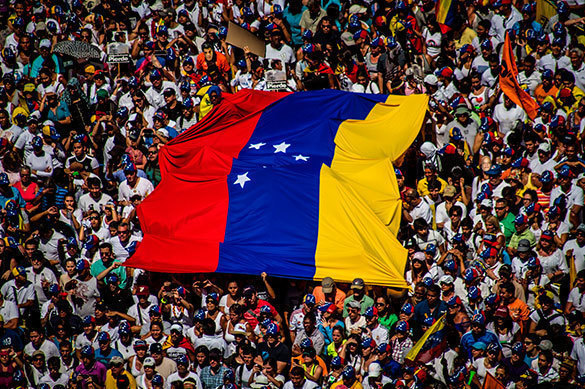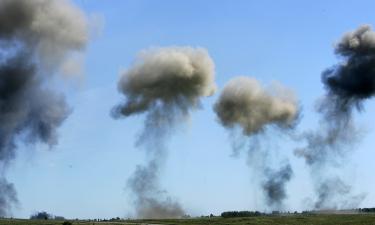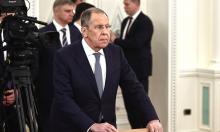Venezuela: "US and Allies Are Terrified of Participatory Democracy"
"US and Allies Are Terrified of Participatory Democracy": An Interview with Sociologist Maria Páez on Venezuela

"With great insight and loyalty to democratic and socialist principles, and exercising the authority given to him [President of Venezuela] by articles 347, 348 and 349 of the Constitution, he [Nicolás Maduro] convened a Constitutional Assembly, the maximum authority of the will of the people, following in the steps of the French Assembly in 1789 and the American Constitutional Assembly of 1787and the Russian Assembly of 1917."
In the following talking to Pravda Report, the Venezuelan sociologist Maria Páez Victor, a researcher at Law Commission in Canada, describes the National Constituent Assembly, and its importance to the Caribbean nation in the face of constant imperialist attacks. It was a splendid triumph of the Venezuelan people (...), and the 8.8 million votes (42%) showed that "chavismo" was alive and well," she says.
What the mainstream media denies to inform the public opinion on behalf of the interests of big companies - especially oil business -, Professor Doctor Maria Páez details here.
Edu Montesanti: Professor Doctor Maria Páez, thank you so very much for granting this interview. How do you see Venezuelan voting last July 30?
Prof. Dr. Maria Páez: It was a splendid triumph of the Venezuelan people - who showed serenity in the face of lies, determination and courage in the face of violence. They showed true political maturity and realized that their votes were the real road to peace in their country.
The opposition in their fantasies and wishful thinking kept on saying that there were only 2 million "chavistas", that it would be a failure, and furthermore, that if they set up the assembly it would create chaos in the country. None of that was true, as the facts showed.
It was a massive voter turnout, and the 8.8 million votes (42%) showed that "chavismo" was alive and well. One can only speculate how many more would have voted if the opposition had not intimidated and actually impeded many more from voting.
There were a lot of heroic moments that day of people evading barricades and guns just to get to the voting station. For example, an entire town in Táchira became famous by evading gunshots, silently escaping the town and crossed on foot two rivers to exercise their right to vote.
How do you evaluate the US sanctions against Venezuela for the National Constituent Assembly, especially on six members of Venezuela's National Constituent Assembly for being "involved in organizing or otherwise supporting the creation" of the ANC?
The USA is simply carrying out its well-known destabilization plans that they have historically carried out in Latin America to get rid of any government that does not tow the USA's line. In other words, that does not conform to its interests.
In the case of these Venezuelan citizens, the sanctions are quite ineffective as they do not have assets in the United States, however, they may affect them personally if they travel.
These are annoying for the individual, but have no impact at all on the government or the people of Venezuela. These sanctions are a display of the United States' bully power and menace, however ineffective.
But the broader issue is that the USA and its allies are actually terrified of participatory democracy, especially the establishment of an elected Constitutional Assembly.
The right wing governments and the imperialist governments screamed that the Venezuelan Constitutional Assembly was illegal. It wasn't - anyone can read the Constitution of 1999 that clearly and unequivocally allows the President to call for such an assembly.
Note that these protests of illegality go completely against International Law, as it violates the universal principle of the free determination of peoples. Countries are free to write their own laws as an expression of their sovereignty, especially if it is done through an elected assembly.
These powerful countries are run by political and economic elites as are the right wing countries of Latin America. They are wondering in fear what would happen if the peoples of Colombia, Peru, Mexico, Brazil, Chile - even Spain or the USA, demanded they too want what Venezuela has: to write their own constitution?
The Mexican government, for instance, with a stroke of a pen, changed their constitution so that they could privatize the erstwhile gem of their country, the oil company PEMEX. Not one Mexican citizen had a say in this.
These last four months, as Venezuela faced economic war, paramilitary attacks on its western boarder, opposition terrorism in the wealthier sections of the cities, President Maduro did not take the authoritarian route of declaring a state of emergency to suspend guarantees of civic rights, which is how Acción Democrática and Copei ruled for 40 years (at one time they ruled for 2 years with guarantees suspended).
With great insight and loyalty to democratic and socialist principles, and exercising the authority given to him by articles 347, 348 and 349 of the Constitution, he convened a Constitutional Assembly, the maximum authority of the will of the people, following in the steps of the French Assembly in 1789 and the American Constitutional Assembly of 1787and the Russian Assembly of 1917.
There is however one great difference with all of these historic previous assemblies: like the Venezuelan Assembly of 1999, the members are not representatives of parties or elites; the members of Venezuela's constitutional assemblies are citizens, not hand picked elites or chosen by parties.
How do you analyze the coverage of the international mainstream media?
It is appalling. Journalistic principle of balanced reporting has all but disappeared when it comes to Venezuela; the only opinions taken into account is that of the opposition.
And what an opposition! Racist, classist and undemocratic: an opposition that openly unleashes street terrorism that openly approves of young men being burned to death because of their dark skin that must indicate they are "chavistas", that lynches them for the same reason.
The opposition "show" of street protest was amply covered by international media, but they were portrayed as "students" (no one verified this) and "freedom fighters".
No one in the media took the time to understand that out of the 355 municipal areas of the country there were violent insurrections only in 8 of them (the wealthier areas) but these had the full force of the international media blowing up their importance.
The agreements reached by the NCA to date are, point by point:
1. The legislative body will meet with the National Economic Council which includes 15 strategic sectors of the economy, and will also discuss political measures to strengthen a diversified productive economic model, away from an economy based on exporting oil.
I consider the hardest part of the agenda for the Constitutional Assembly will be the economic task: to trying to protect the economy from sabotage and setting the bases for a diversified, post-oil economy.
They are meeting with the most distinguished economic experts for this. It will not be easy, of even perhaps feasible, to legislate these things. The economy has been brought to its knees by run away inflation and that is the great conundrum.
As well, one great problem is that economic power is still in the hands of the wealthy elite; that economic inequality has to be tackled.
Yet it is not the first time in its history and not the first time that a government has had to face this - consider the economies of Europe after the II World War. They found solutions and I hope Venezuela will too; they are certainly trying.
Yet the amazing thing about Venezuela is that even 1/8th of such economic problems would have brought down governments in USA, Canada or Europe.
Yet, despite the economic situation, the people hold fast to their government. That is truly remarkable.
2. The constituents also approved Tuesday during their second session a decree of coexistence with the state's public powers, reiterating that they will not replace the National Assembly that is currently led by the opposition.
That is the prerogative of the Constitutional Assembly to decide such a thing. In actual fact, it is the Constitutional Assembly that now holds real power, the National Assembly, due to its obstinacy and anti-democratic stance of not adhering to the sentences of the Supreme Court has made itself redundant and out of law.
The real enemy of Venezuela at this time is not the National Assembly or any other state power; it is the USA, Big oil, its allies in other governments and corporations that covet the country's great oil and mineral wealth.
3. Rejecting the unilateral measures imposed by the U.S. government against Venezuela and reflected its support for President Nicolas Maduro against foreign threats.
Trump's outrageous military threats against Venezuela have simply shown the world again what a disreputable and ignorant man he is, quite undeserving of the position he holds. Even his right-wing government allies in Latin America - Mexico, Colombia, Peru, Chile, Brazil, Argentina- reacted swiftly to state their disagreement with any military intervention by the USA against Venezuela.
So they should - as any one of them could be next in the list of undesirables that the USA could come up with. They also know that any military intervention by the US on Venezuelan soil would unleash a regional conflict such that would imperil the very markets they wish to control.
It is important also to point out that Venezuela's right to elect a Constitutional Assembly is backed by the ALBA countries, the Caribbean countries, and the Non Aligned Countries which are 2/3 of all the countries of the world. The UN has as a whole also backed Venezuela's right to write its own laws.
4. Supporting of the Bolivarian National Armed Forces in its defense of the Venezuelan people after the terrorist attack carried out Sunday against Fort Paramacay in the central state of Carabobo.
The attack on the Fort Paramacay was not a military uprising- it was carried out by a small group of civilians masquerading as soldiers led by two former soldiers who in fact were wanted by the law. It was a clear terrorist attack.
But a very stupid one: a handful of men attacking a fort full of armed soldiers? They were quickly subdued, which leads one to conclude that they really had no expectation of success, it was again a "show" for the international media, and an attempt to portray that the country was in chaos, which it was not.
The Venezuelan opposition has just not realized, or wanted to accept that the Civil-Military union in Venezuela is strong, based as it is in the Bolivarian ideology: that they are the true inheritors of the liberation army of Bolívar, not an army that represses it own people - like those trained by the sinister US School of the Americas.
This military transformation was a solid legacy of Hugo Chávez. The military are also the people. The Venezuelan army has never left its soil to invade or wage war against any neighbour, it has only left its soil in the 19th century to liberate Colombia, Bolivia, Ecuador, Peru from the Spanish Empire.
How do you see each of these points, Professor Doctor Maria Páez, and what can we expect to the near future?
It is now the turn of the 545 members of the Constitutional Assembly, genuine representatives of the people of Venezuela, to establish a constitution and a rule of law that truly leads to peace and justice by closing the legal loopholes to terrorists, to those who destabilize the economy, those who sell their country for a bunch of dollars.
Have no doubts about it; the Constitutional Assembly of Venezuela is right now not just changing laws, it is carrying out a revolutionary cultural and political change that will have repercussion far beyond Venezuela's border.
They are defining a new type of power, a new way of the people exercising their will and sovereignty, ushering in the communal state, unleashing a new wave of political creativity that promises to sweep away the dialectic of colonization, a new philosophy of the communes and a firm positioning of the working class of Venezuela as genuine actors of their political body.
The destiny of Venezuela is now in the hands of its people, as it should be, the Brave People of Venezuela.
As for the rest of the world, they have the choice of siding with a democratic government that poses no threat to world peace, that has not declared war or invaded any country, and has no state of the art weaponry and is simply grappling with its own domestic economic problems and trying to feed, clothe, house its own people.
Or, side with immoral persons whose parties have consistently put their own narrow political interest before that of their people, not hesitating to keep food and medicines from them, openly asking banks not to loan to their own country, lobbying the USA and Europe to intervene and give them the power that their own people will not give them, that burned and lynched dark skinned people and carried a campaign of utter racism and hate, just for their own benefit.
Paraphrasing Fidel, history will not absolve them.
Subscribe to Pravda.Ru Telegram channel, Facebook, RSS!




